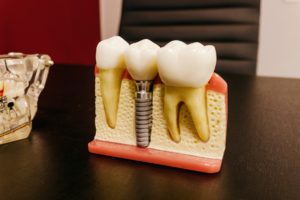How to Recognize Dental Implant Failure
November 4, 2023
 A dental implant is unlike any other tooth replacement method because it treats both the root and the crown. It is the most reliable solution for missing teeth, with over a 95% success rate. Dental implants are proven to last for 30 years or longer with the correct care, but failure can still occur. It’s important to contact your dentist at the first sign of a problem to avoid dental implant failure.
A dental implant is unlike any other tooth replacement method because it treats both the root and the crown. It is the most reliable solution for missing teeth, with over a 95% success rate. Dental implants are proven to last for 30 years or longer with the correct care, but failure can still occur. It’s important to contact your dentist at the first sign of a problem to avoid dental implant failure.
Common Causes of Dental Implant Failure
The risk of failure is less than 5%. It can occur immediately after your placement surgery or several years down the road. Complications can be caused by multiple factors, including:
- Insufficient Bone Support: Your jaw must have good density to support your dental implants long-term. Patients with bone loss may require additional procedures to enhance the strength of their jaw, like bone grafting.
- Failed Osseointegration: The overall success of dental implants relies on your jawbone fusing to the post through a process called osseointegration.
- Peri-Implantitis: A preventable infection is a common cause of dental implant failure. It will destroy the supporting structures of your teeth and dental implants if it is not addressed quickly.
Signs of Dental Implant Failure
The most common signs of dental implant failure include redness, pain, and inflammation. If your implant feels loose after your mouth has healed, it can be a sign of a complication. It’s best to contact your dentist right away for an appointment. They’ll pinpoint the problem to provide the quick care you need to keep dental implant failure at bay.
Preventing Dental Implant Failure
You can safeguard your investment and ensure your new smile lasts for decades by following a few tips:
- Follow Aftercare Instructions: Follow your dentist’s instructions while your mouth heals, like sticking to a liquid diet and soft foods until your bone has integrated with your post.
- Practice Good Oral Hygiene: Brush your teeth at least twice a day and floss daily.
- Live a Healthy Lifestyle: Don’t smoke or drink alcohol in excess.
- Watch What You Eat: Limit your consumption of sugars and starches. Moderate hard or crunchy foods.
- Break Bad Dental Habits: Avoid any habits that can damage your teeth, like crunching ice or chewing on your fingernails.
- Visit Your Dentist Regularly: Schedule a cleaning and checkup every 6 months with your dentist.
You won’t have to worry about your new smile failing by giving your mouth the attention it needs. With the right habits at home and regular dental care, your dental implants can last for years.
About Dr. Jan Ortiz
Dr. Ortiz graduated from the University of Puerto Rico School of Dental Medicine and he continued his education at the Tufts University School of Dental Medicine, focusing on patients with special needs. He has also completed additional training in orthodontics, dentofacial orthopedics, and implant dentistry. Book an appointment through his website or (972) 656-2304.
No Comments
No comments yet.
RSS feed for comments on this post.
Sorry, the comment form is closed at this time.
